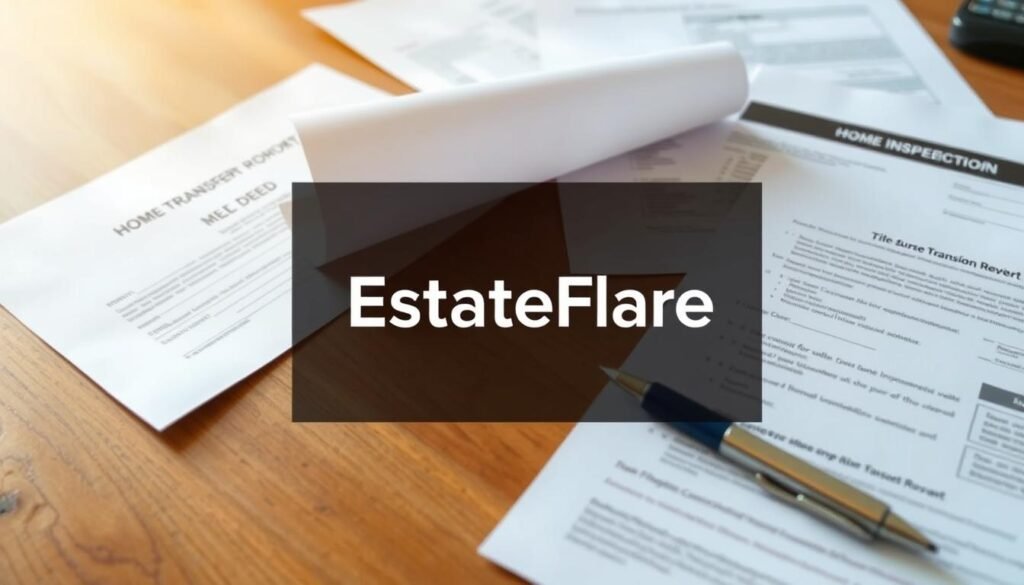Did you know 36% of home sales in the U.S. happen without a real estate agent? This can save you thousands in commission fees. But, it also brings its own set of challenges. We’ve learned from our own experiences selling without an agent. Here are the 7 most common mistakes to avoid when selling real estate without an agent.
Key Takeaways
- Understand the importance of pricing your property accurately based on market trends and property condition.
- Develop an effective marketing strategy to reach the right buyers and generate high-quality leads.
- Familiarize yourself with the legal and paperwork requirements to ensure a smooth transaction.
- Prepare your home for showings by decluttering, staging, and enhancing curb appeal.
- Recognize the time and effort required to handle the sales process without professional assistance.
Pricing pitfalls: How to avoid undervaluing your property
When selling your home without an agent, setting the right price is key. If you price too low, you might miss out on a lot of money. To avoid this, consider the location, condition, and current market trends. This will help you find the best price for your home.
Factoring in location, condition, and market trends
The value of your home depends a lot on where it is. Look at recent sales in your area to understand the market value. Also, think about your home’s condition and any updates you’ve made. These can really affect the price.
Keeping up with market trends is also important. Watch the number of homes for sale, how long they stay on the market, and changes in demand. This helps you price your home right and avoid underpricing it.
Conducting thorough market research
Good market research is essential for setting the right price. Look at what similar homes have sold for in your neighborhood. This gives you a good starting point for your pricing.
Also, study how prices change in your area over time. This helps you know the best time to sell. By doing your homework, you can avoid pricing mistakes and get a good price for your home.
“Pricing your home accurately is crucial to maximizing your profits and ensuring a successful sale. By factoring in location, condition, and market trends, you can avoid the costly mistake of undervaluing your property.”
Marketing mishaps: Reaching the right buyers effectively
Getting your property sold without an agent starts with good marketing. If you don’t reach the right buyers, you might miss out on many potential buyers. It’s key to use online platforms, social media, and old-school ads to show off your property. This will draw in the right buyers for a successful sale.
To steer clear of marketing mistakes and promote your property well, try these tips:
- Make your online listings stand out with great photos and detailed descriptions to grab buyers’ attention.
- Use social media to show off your property and reach more people.
- Try targeted advertising on Google and Facebook to find buyers looking for homes like yours.
- Work with local real estate agents or pros to tap into their buyer networks.
- Host open houses or virtual tours to give buyers a personal look at your property.
“Effective marketing is the key to unlocking the right buyers and ensuring a successful sale of your property.”
With a solid marketing plan, you can reach more people and find the perfect buyer for your home.
Negotiation nightmares: Navigating offers and counteroffers
Negotiating the sale of your home can be tricky and emotional. It’s key to know your bargaining power and keep personal feelings out of it. This way, you can avoid negotiation mistakes and get the best price for your home.
Understanding your bargaining position
Start by researching the local real estate market and your home’s value. This info helps set a fair asking price and shows your bargaining position to buyers. Knowing the market, comparable sales, and your home’s unique features helps you make smart choices when handling offers and counteroffers.
Separating emotions from the negotiation process
Selling a home can be emotional, especially if it holds personal value. But, it’s important to separate emotions from the negotiation process. Don’t get defensive or take offers personally. Focus on the financial side of the deal instead. Staying professional and objective helps you navigate negotiations better.
Successful negotiations mix knowing your market, staying calm, and clear communication with buyers. By avoiding negotiation mistakes and managing your emotions in negotiations, you’ll get the best deal for your home.
“The key to successful negotiations is to remain objective, focus on the facts, and never let your emotions get the better of you.”
Mistakes when selling: Overlooking legal and paperwork requirements
Selling a home without a real estate agent can be tough. It’s especially hard when dealing with legal and paperwork needs. Missing important documents or not following local rules can cause delays and legal problems. It’s key to know what paperwork is needed and get legal advice when it’s necessary.
One big mistake is overlooking legal documents. Documents like the sales contract and property disclosures are vital. They protect both the seller and the buyer. Not understanding these documents can lead to disputes or legal fights later on.
Another mistake is neglecting to comply with local regulations. Each area has its own rules for selling a home. This includes permits and zoning laws. Ignoring these can result in fines, delays, or even stop the sale.
- Familiarize yourself with the necessary legal documents, such as the sales contract, property disclosures, and any local regulations.
- Seek the guidance of a real estate attorney or legal professional to ensure you are meeting all the legal and paperwork requirements.
- Review and understand the legal mistakes you should avoid, such as overlooking critical documents or failing to comply with local regulations.
By focusing on the legal and paperwork requirements and getting professional advice, you can sell your home confidently. This way, you can avoid legal issues and delays.

“Overlooking legal and paperwork requirements can jeopardize the entire sale. Seek professional guidance to ensure a smooth and successful transaction.”
Sales pitfalls: Failing to prepare your home for showings
When you sell your home, getting it ready for buyers is key. Skipping this step can lead to mistakes that hurt your home’s value and appeal.
Decluttering for Maximum Appeal
Start by decluttering. Too much stuff makes your home look small and messy. Clear out what you don’t need daily. This makes your home welcoming and inviting.
Strategic Home Staging for Showings
After decluttering, focus on home staging. Arrange furniture and add decor to show off your home’s best parts. A pro stager can help make your home shine during showings.
By avoiding mistakes and putting effort into decluttering and staging, you can sell your home faster and for more money.
Sales blunders: Ignoring curb appeal and first impressions
When selling your home, it’s easy to focus on the inside. But, the exterior is just as important. A bad first impression can cost you a sale.
To avoid curb appeal mistakes, improve your home’s outside look. This includes landscaping, power washing, and small repairs. Every detail matters for a good first impression of your exterior appearance.
- Keep your lawn neat and free of debris.
- Clean your siding, windows, and other outside surfaces.
- Paint your front door, trim, and shutters to stand out.
- Get new house numbers and a welcoming porch or entryway.
- Trim shrubs and add flowers or plants for color.
By focusing on these areas, you can make a great first impression. This will attract buyers and leave a positive impression of your home.

“The exterior of your home is the first thing potential buyers see, and it can make or break a sale. Investing in curb appeal is a crucial step in the home-selling process.”
| Curb Appeal Factor | Impact on First Impression | Estimated Cost |
|---|---|---|
| Landscaping | High | $500 – $2,000 |
| Exterior Cleaning | Medium | $100 – $500 |
| Exterior Painting | High | $1,000 – $5,000 |
| Entryway Upgrades | High | $500 – $2,000 |
Sales errors: Mishandling disclosures and property defects
Selling a home without an agent means you must know your legal duties well. Not telling buyers about known problems can cause big issues. It can lead to lawsuits, mistrust, and a failed sale. It’s key to be open and honest about the property’s state to build trust and sell it successfully.
Understanding Your Legal Obligations
When selling your home, you must tell buyers about any defects or issues. This includes structural problems, plumbing issues, and safety risks. Not sharing this info can lead to buyers backing out or suing you.
Maintaining Transparency with Potential Buyers
To build trust, be clear about your home’s condition. Give detailed disclosures about any known problems. This shows you’re honest and helps buyers make good choices. Being open and addressing concerns can help you sell your home successfully.
“Transparency and trust are the foundations of a successful real estate transaction. As a seller, it’s your responsibility to provide potential buyers with a clear and accurate picture of the property’s condition.”
Sales mishaps: Choosing the wrong pricing strategy
In real estate, pricing is key to a successful home sale. Finding the right balance between profit and attracting buyers is crucial. It involves understanding the market, comparing sales, and knowing your local area well. Ignoring this can lead to pricing strategy mistakes.
One big mistake is underpricing your home. It might attract buyers quickly, but you could lose out on a lot of money. On the other hand, overpricing can scare off buyers and slow down the sale. This can cause frustration and lost chances.
- Do deep market research to find the best price for your home.
- Look at recent sales of similar homes to make sure your price is fair.
- Highlight your home’s special features, condition, and location to support your price.
- Keep an eye on the market and adjust your price as needed.
“Pricing your home correctly from the start is crucial to a successful sale. Avoid common pricing mistakes that can cost you dearly.”
With a smart, informed pricing strategy, you can draw in the right buyers and get the most from your sale. Your home’s value shows the effort and planning you put into selling it.

Selling missteps: Neglecting to market your property effectively
When you sell your home without an agent, marketing is key. Not using different marketing channels can cut down your property’s visibility. Use online platforms and social media to reach more people and find more buyers.
Leveraging online platforms and social media
Use online platforms like real estate sites and social media to show off your home. Make your posts interesting by focusing on your home’s best features. Ask your friends and family to share your listings to spread the word.
Utilizing professional photography and videography
Invest in professional photos and videos to showcase your home. Good visuals can impress buyers and show off your home’s best sides. Make sure your listing has great photos and a virtual tour to grab buyers’ attention.
By using online platforms, social media, and professional photos, you can market your property well. A good marketing plan is key when selling your home without an agent.
Click here to learn moreabout common mistakes when selling your house without an agent
Sales oversights: Failing to screen potential buyers
When you sell your home without an agent, screening buyers is key. Not checking if a buyer can afford the home can cause delays and failed deals. It’s important to have a good vetting process to find serious buyers and avoid problems.
Here are some things to think about when screening buyers:
- Financial Qualifications: Ask for pre-approval letters to make sure the buyer can pay. Check their credit score, debt, and money they can use.
- Qualifying Buyers: Look at the buyer’s job, how stable it is, and where their money comes from. This helps know if they can get a loan and pay on time.
- Buyer Vetting: Do a deep background check. Check who they are, their past in real estate, and any issues that might stop the sale.
By carefully screening and qualifying buyers, you can avoid big problems. This effort can make your home sale go smoothly and save you from costly mistakes.
| Screening Criteria | Importance | Key Considerations |
|---|---|---|
| Financial Qualifications | High | Pre-approval letter, credit score, debt-to-income ratio, liquid assets |
| Employment Status | High | Job stability, income sources, ability to secure financing |
| Background Check | High | Identity verification, previous real estate transactions, potential red flags |

“Carefully screening and qualifying potential buyers is essential for a smooth and successful home sale. Don’t let buyer-related issues derail your transaction.”
Sales gaffes: Underestimating the time and effort required
Selling a home without a real estate agent can be rewarding but takes a lot of time and effort. Homeowners often don’t realize how much work it is. This includes marketing, showing the property, negotiating, and paperwork. It’s crucial to manage your time well and balance your schedule for a smooth sale.
Prioritizing the Selling Process
Going solo in selling a home means a big commitment of time and effort. You’ll need to get the property ready, host open houses, and handle inquiries and contracts. If not managed well, it can get overwhelming. By focusing on the sale and balancing your schedule, you can keep up with tasks without losing your personal and professional life.
- Develop a detailed timeline and action plan to stay on track
- Allocate specific blocks of time each week to focus on the selling process
- Delegate or outsource tasks that don’t require your direct involvement
- Communicate with your family or housemates to manage disruptions during showings
Managing the time and effort needed to sell your home without an agent is key. It can make the difference between a smooth sale and a stressful one. By focusing on the sale and keeping a balanced schedule, you can make it through to a profitable sale.
Sales slip-ups: Overlooking closing costs and expenses
When you sell your home without an agent, it’s key to keep track of all closing costs and expenses. These costs can add up quickly, affecting how much money you get from the sale. By planning for these expenses ahead of time, you can avoid surprises and make the closing process smoother.
Legal fees are a big part of closing costs. Dealing with the legal side of selling a home can be tough. Getting a real estate attorney can help a lot and protect your rights. You’ll also need to pay for title insurance, which protects the buyer’s rights and is often needed for a mortgage.
Don’t forget about transfer taxes, which governments charge on the sale of a home. These taxes are a percentage of the sale price and can vary a lot based on where you live. Not budgeting for these taxes can mean less money for you than you thought.
- Legal fees
- Title insurance
- Transfer taxes
- Moving expenses
- Home repairs and improvements
There are also selling expenses to think about, like moving costs and any repairs or improvements needed. These can add up fast and affect how much money you get. It’s important to plan for these costs early on.
“Overlooking closing costs and expenses can be a costly mistake when selling your home without an agent. Careful budgeting and research are key to ensuring a successful and financially rewarding transaction.”
Being aware of these costs can help you plan better for selling your home. This way, you can avoid surprises and make sure you get the most money from the sale.

Sales faux pas: Neglecting to follow up and maintain communication
When selling your home without an agent, keeping in touch with buyers is key. Not staying in touch can mean missing out on chances and losing connections. A good plan for talking to buyers, quick replies to questions, and open talks can build trust. This can lead to more interest and a successful sale.
Keeping potential buyers engaged and informed
To avoid this common mistake, focus on talking to your buyers. Here are some tips to keep them interested and informed:
- Always reply quickly to emails, calls, or your online listing. Quick answers show you’re serious and professional.
- Share updates on the sale, like showings, offers, and listing changes. Keeping buyers updated builds trust and keeps them interested.
- Make your messages personal by addressing their specific needs and worries. This can make you stand out and create a stronger bond.
- Use different ways to talk to buyers, like email, texts, and social media. This keeps the conversation open and effective.
By focusing on follow-up, communication with buyers, and maintaining engagement, you can avoid a costly mistake. This is a crucial part of selling your home.
“Consistent follow-up and transparent communication are the keys to securing a successful sale when selling your home without an agent.”
WHAT ARE THE ADVANTAGES OF BEING A FIRST-TIME HOMEBUYER?
Conclusion: Avoiding common pitfalls for a successful sale
Selling your home without a real estate agent can be rewarding but challenging. Knowing the common mistakes helps you avoid them. This way, you can sell your property confidently and get the best value. From pricing right to marketing and talking to buyers, following best practices is key.
One important step is to do thorough market research. Knowing the local market, your property’s condition, and its unique points helps you price it right. Also, good marketing and reaching the right people can greatly help your sale.
- Pricing your home accurately based on market conditions and your property’s features
- Effectively marketing your home to reach the right buyers through various channels
- Navigating the negotiation process with a clear understanding of your bargaining position
- Maintaining transparency and following legal requirements throughout the sale
- Preparing your home for showings to create a positive first impression
- Screening potential buyers to ensure a smooth and successful transaction
- Staying organized and managing the time and effort required for a successful home sale
By being proactive and avoiding common mistakes, you can sell your home successfully without an agent. Remember, paying attention to details and having a good strategy are crucial in selling your home.
“The key to [avoiding mistakes] when selling your home is being informed, organized, and prepared. With the right strategy, you can achieve a successful sale without an agent.”
Frequently Asked Questions (FAQ)
Starting to sell your home without an agent can raise many questions. Here are some common ones, along with our advice to help you:
Q: What are the key factors to consider when pricing my home for a successful sale? You can find valuable information on factoring in location, condition, and market to ensure you price your home competitively.
Q: How can I effectively market my property and reach the right buyers? Using online platforms, social media, and professional photography can help. These tools can market your home well and attract the right buyers.
Q: What legal and paperwork requirements do I need to be aware of when selling my home on my own? Knowing your legal duties and being clear with potential buyers is key for a smooth sale.



